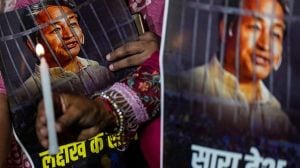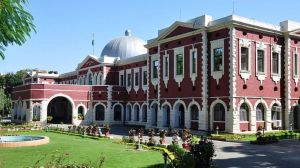Drought dries up work for daily wage earners
Farmers are not the only victims of the drought in Jehanabad,Bihar,with daily wage earners such as ropanis women engaged to sow paddy saplings....
Farmers are not the only victims of the drought in Jehanabad,Bihar,with daily wage earners such as ropanis women engaged to sow paddy saplings also struggling to survive. With many farmers reluctant to sow their crops,some ropanis have only managed to get work for two days in the entire paddy-sowing season.
While ropanis usually earned about 150 kg rice as wages for their work every paddy plantation season,this year none have earned more than 20 kg. Farmers will have grain stock till November-December,but we will soon start starving to death, they say. Rukmini Devi,who considers herself lucky to get her second days work at Mehi fields of Sikaria village near Jehanabad,says: I have already taken over Rs 7,000 loan on 10 per cent interest. My wages of 4 kg rice for the day cannot feed my family for more than five days.
Sangita Devi,a ropani from Musepur village,said that Mehi and Dagra paddy fields gave her 120 kg of rice as wages last season,but she has earned only 8 kg rice this time. Her husband is now thinking of going to Punjab or Haryana to work. Sangita says she has not tasted pulses for two months because of soaring prices. Now even rice is going out of our reach, she says,close to tears.
It is late August and the paddy plantation season is virtually over,but many fields are still barren. Only a few farmers have ventured to water fields with pumping sets,with groundwater level receding fast in the absence of rains.
While almost 90 per cent farmers have now given up on paddy plantation,Devendra Kumar is one of a handful that has resorted to using pumps.
It took two full days to make my one bigha land ready for paddy sowing. I have to pay Rs 50 for very hour of running pumping sets, says Kumar,who now regrets his decision. He says that if there is no rain,he would need to irrigate the field every two days,adding up to Rs 3,000 for cultivation on one bigha. And as he planted the rice late,the yield is expected to be below par.
Other farmers like Sunil,who has two bighas of land at Sikaria,decided against cultivation. I had to take a loan and I was not sure I would grow enough paddy to repay it. Id rather take up other work and wait for government relief than burn my heart and soul with arduous paddy cultivation, he says.
Ravi,who has sown just half bigha paddy,says that as farmers are heavily dependent on rain,it is wise to wait for the Rabi season and government relief. He adds that many people have started migrating to other states in search of jobs,whereas paddy sowing season usually meant an influx of labour into the state.





- 01
- 02
- 03
- 04
- 05


























